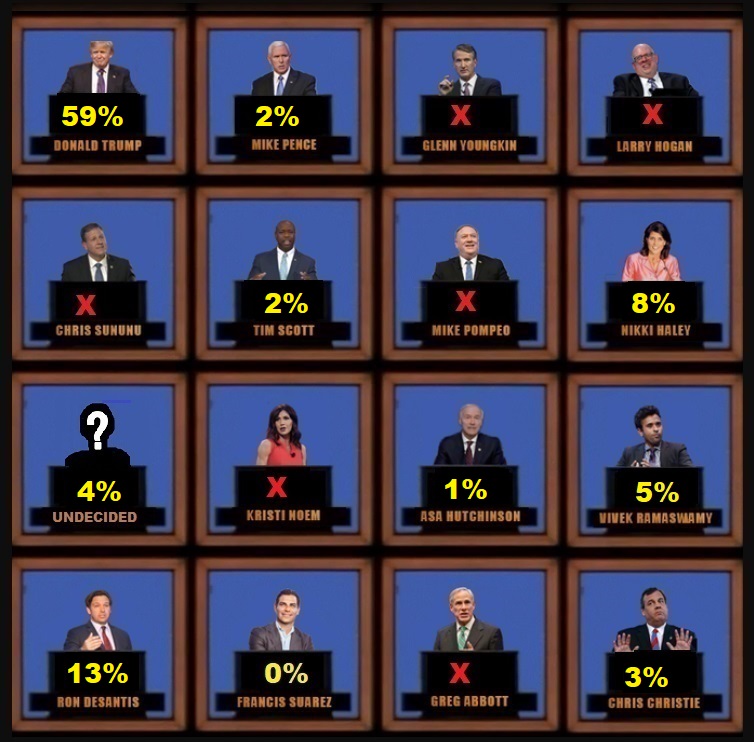There is one segment of the swamp which receives relatively little attention, especially given their ability to muck up the Republican-Populist movement: political consultants.
This can be seen in the failure of so many of Mr. Trump’s challengers to capture the attention, let alone the support of, a large swath of GOP populists. Even if one were oblivious and/or ignorant of the movement and its supporters’ aspirations and frustrations, a half-competent candidate could at least feign their solidarity with them. Instead, these candidates have proven tone deaf to the movement; and, rather than garner support, have managed to alienate the bulk of the GOP’s populist base.
It would be easy to write this off to a failure of the candidates, and deem the presidential primary a RINO hunt with an over-abundance of prey. But many of these candidates have political instincts and skills, and have been elected to important political offices and/or served in significant appointed positions. How could they have missed the mark so badly?
They had help.
If memory serves, I recall a news report of a Louisiana mayor who was arrested for taking a midnight stroll through downtown stark naked. Come morning, before a rapt gaggle of journalists, the mayor endeavored to excuse his actions: “I got some bad advice.”
It seems the (former?) mayor’s political consultants may be advising many of Mr. Trump’s GOP challengers. Yet, it is not necessarily a case of political consulting malpractice. Doubtless, a host of these political consultants realize the Republican-Populist movement is a threat to their cushy existence. Where else but the swamp can people who lose so often keep making piles of money? (And don’t you dare say the Detroit Lions). The unaccountability is only matched by these political consultants’ insularity and hubris. They cozy up to political entities such as national committees, like the RNC, and “dark money” donors’ organizations. Then, regardless of their win-loss record, they are routinely hired by ambitious staffers who hope to one day become…? Wealthy political consultants. Surveying the bios of many current political consultants, it is not a vain hope.
Such reptilian political consultants recognize how, sooner or later, the GOP populist movement will come to drain their lucrative corner of the swamp. These miserable consultants may love company, but they do not love the movement that seeks to put them out of business. Whatever these swamp critters lack, they do have a survival instinct. Consequently, while these self-anointed political “gurus” bilk their more gullible clients, they help turn their candidate cash cows against the movement (in the cases where this may be necessary). They persuade their candidates to seek distance, ignore, and/or bash the GOP populist movement.
Worse, during some campaigns, GOP political consultants – either deliberately or through ignorance – reach out for support to the most extreme right-wing elements and, thereby, falsely impute that they are part of the Republican-Populist movement. Such antisemitic and bigoted individuals are decidedly not part of the GOP populist movement. Rightly, the media is quick to point out such shameful approaches for support; wrongly, however, the media is quick to promote the misperception that such extremists are not only part, but the bulk of, the movement. It is a demonstrable lie; however, long before the lie can be refuted the electoral damage to the movement is done.
Still, let us not paint all political consultants with such a broad brush. Some do serve their candidates well, and I can personally attest to the GOP populist sensibilities of a Michiganian currently toiling away for a national Republican campaign committee. So, how can one gauge the GOP populist bona fides of a political consultant? The competent ones recognize their subordinate role, advising but not deciding; and never suggest their candidate be anything less than authentic. The Republican-Populist movement has an intuitive sense of who understands it and, equally, who does not. Therefore, over the course of a campaign, authenticity will reveal a candidate to be a friend or foe of the GOP populist movement, and will allow GOP populists to vote accordingly.
Yet, what if the candidate is a chameleon, spouting populist rhetoric just to get elected? What if, heaven forfend, such a charlatan deceives enough voters to win? Well, just remember the adage: fool me once, shame on you; fool me twice, shame on me. Once again, GOP populists will vote accordingly.
Yes, this means of identification is not foolproof, for it is a roundabout method. It is based upon first sizing up a candidate; then, if one dares, peeking behind the curtain at their consultant. Even then, it may not be easy. In many instances the political consultant clings to the shadows, because it facilitates their unaccountability for failure and/or for their vicarious attacks upon the GOP populist movement. True, some of the more “successful” ones wind up pundits on cable shows, etc., while being even more handsomely remunerated for dumping on GOP populists. Still, most prefer to stealthily keep the gravy train on the lucrative campaign track and do their mudslinging of the movement through others.
Think about it: you know which GOP presidential primary contenders really dislike the Republican-Populist movement. Do you know who their political consultants are? Same thing applies for other national, state, and even local offices, and so does the difficulty in identifying the consultants. Thus, in many ways, then, the Republican-Populist movement’s most elusive quarry is the swamp’s unctuous consultants.
Challenge accepted.












